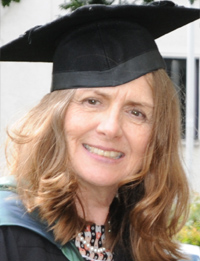
Sophia Centre
Postgraduate Conference Dec 2016
By Stevi Gaydon
I was speaking at this, my first post graduate conference, so I was nervous! However, many familiar faces, the easy-going friendliness and generally welcoming atmosphere dispelled that. There was plenty of time to socialise, talking to the participants was a joy and all had a story to tell.
It was a well-attended event with another contingent linking in from around the globe, via Webex, emphasising once again the Sophia Centre's accessibility and international nature.
Nick Campion at the Sophia Centre Postgraduate Conference 3 Dec. 2016
As always at a Sophia Centre event, the breadth and depth of the presentations was extraordinary and absorbing. Ada Blair had a particularly memorable day, she not only presented some of her research into the impact of Sark's Dark Sky policy on its inhabitants but also celebrated the Sophia Centre Press publication of her monograph on the subject.
Then, to business and finance. Faye Cossar described her use of the Huber Age Clock technique as an organisational development model and her development of an astrologically based Company Clock model. Jonathan Jones explored the links between astrology, financial investment and speculation from ancient times to the present-day. In contrast, Darby Costello's exposition of Venus traced the planet's historical associations with love, beauty, pain and loss though the ages and reflected on Venus manifestations in the twenty first century.
Sophia Centre tutors at the Postgraduate Conference 3 Dec. 2016
History was focus after lunch. Kim Farnell, described her experiences and discoveries as she annotated and modernised, MS Sloane 99, Elizabethan astrologer, Simon Forman's, approach to medical astrology. Next, to the early twentieth century. I argued that Alan Leo was a modernist because his concerns when reforming astrology were modern. Jenn Zahrt then discussed the attempts by astrologers of the Weimar Republic (1919-1933) to justify astrology as a soft science and suggested this work had value today.
Wendy Stacey's study is contemporary, she discussed the impact of changes in birth days and times for astrologers and examined the astrology behind the changing attitudes to the birth process. Finally, Morag Feeney-Beaton's analysis of the ancient association of spinning and weaving with fate and destiny drew together ideas and practical experience of producing cloth.
Rich, varied and thought provoking presentations together with a warm atmosphere, it was an inspiring and memorable day.

Browse previous issues here

The SPNews welcomes articles, features, reviews, ideas, art work and photography.
The Ed's email
is always open.
Pam Armstrong
Newsletter Ed'.






